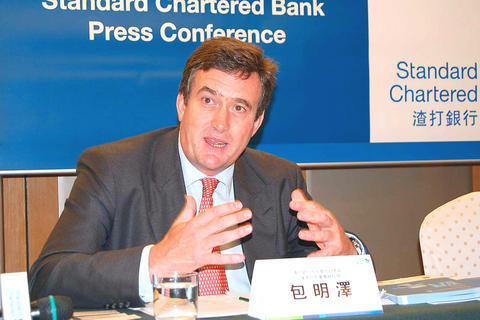Standard Chartered Bank expects to double its client revenue in wholesale banking in the greater China market within the next four years by leveraging the resources obtained through the buyout of Hsinchu International Bank (新竹國際商銀), the British lender said yesterday.
"It is an exciting deal and the acquisition helps increase six times the number of wholesale banking customers," Andrew Bester, regional head of Standard Chartered's wholesale banking client relationships for greater China and Japan, told a media briefing in Taipei yesterday.
The transaction brings a significant customer base to the bank, including the supply chain across Asia of a major US global retailer, to which the bank hitherto had no access, Bester said.

PHOTO: YANG YA-MIN, TAIPEI TIMES
The British banking group announced last September it would take over its Hsinchu-based rival, marking the first buyout of a local bank by foreign interests as the regulator sought to consolidate the crowded banking industry.
The acquisition makes Standard Chartered the international bank with the biggest franchise network in Taiwan, with 86 branches nationwide.
The bank said the deal would give it access to a considerable number of Taiwanese customers operating in China, where it plans to have 40 outlets -- up from 21 at present -- by the end of this year and completes its layout for markets in Taiwan, Hong Kong and China.
Standard Chartered plans to keep building franchises in the region to strengthen its status as one of the top three foreign wholesale banks in the greater China market and double client revenue by 2011, Bester said.
The bank saw a 39 percent annual rise in client revenue in greater China wholesale banking last year, beating an Asia-wide 23 percent in group revenue and Taiwan's 37 percent.
The bank has set up its Taiwan desk, comprised of a group of Taiwanese bankers in cities including Suzhou and Shanghai, to serve China-based Taiwanese clients, said Helen Hui (許穗華), head of client relationships at Standard Chartered Taiwan's wholesale banking unit.
International banks have aggressively taken over Taiwanese rivals to expand their business base in the region, posing a grave threat to local lenders that dominate lending to Taiwanese companies operating overseas and in China.

KEEPING UP: The acquisition of a cleanroom in Taiwan would enable Micron to increase production in a market where demand continues to outpace supply, a Micron official said Micron Technology Inc has signed a letter of intent to buy a fabrication site in Taiwan from Powerchip Semiconductor Manufacturing Corp (力積電) for US$1.8 billion to expand its production of memory chips. Micron would take control of the P5 site in Miaoli County’s Tongluo Township (銅鑼) and plans to ramp up DRAM production in phases after the transaction closes in the second quarter, the company said in a statement on Saturday. The acquisition includes an existing 12 inch fab cleanroom of 27,871m2 and would further position Micron to address growing global demand for memory solutions, the company said. Micron expects the transaction to

Nvidia Corp’s GB300 platform is expected to account for 70 to 80 percent of global artificial intelligence (AI) server rack shipments this year, while adoption of its next-generation Vera Rubin 200 platform is to gradually gain momentum after the third quarter of the year, TrendForce Corp (集邦科技) said. Servers based on Nvidia’s GB300 chips entered mass production last quarter and they are expected to become the mainstay models for Taiwanese server manufacturers this year, Trendforce analyst Frank Kung (龔明德) said in an interview. This year is expected to be a breakout year for AI servers based on a variety of chips, as

Global semiconductor stocks advanced yesterday, as comments by Nvidia Corp chief executive officer Jensen Huang (黃仁勳) at Davos, Switzerland, helped reinforce investor enthusiasm for artificial intelligence (AI). Samsung Electronics Co gained as much as 5 percent to an all-time high, helping drive South Korea’s benchmark KOSPI above 5,000 for the first time. That came after the Philadelphia Semiconductor Index rose more than 3 percent to a fresh record on Wednesday, with a boost from Nvidia. The gains came amid broad risk-on trade after US President Donald Trump withdrew his threat of tariffs on some European nations over backing for Greenland. Huang further

HSBC Bank Taiwan Ltd (匯豐台灣商銀) and the Taiwan High Prosecutors Office recently signed a memorandum of understanding (MOU) to enhance cooperation on the suspicious transaction analysis mechanism. This landmark agreement makes HSBC the first foreign bank in Taiwan to establish such a partnership with the High Prosecutors Office, underscoring its commitment to active anti-fraud initiatives, financial inclusion, and the “Treating Customers Fairly” principle. Through this deep public-private collaboration, both parties aim to co-create a secure financial ecosystem via early warning detection and precise fraud prevention technologies. At the signing ceremony, HSBC Taiwan CEO and head of banking Adam Chen (陳志堅)